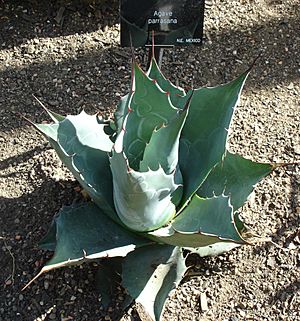Cabbage head agave facts for kids
Quick facts for kids Cabbage head agave |
|
|---|---|
 |
|
| Kew Gardens, August 2005 (Bluemoose) | |
| Conservation status | |
| Scientific classification |
|
| Kingdom: | Plantae |
| Clade: | Tracheophytes |
| Clade: | Angiosperms |
| Clade: | Monocots |
| Order: | Asparagales |
| Family: | Asparagaceae |
| Subfamily: | Agavoideae |
| Genus: | Agave |
| Species: |
A. parrasana
|
| Binomial name | |
| Agave parrasana A.Berger
|
|
| Script error: The function "autoWithCaption" does not exist. | |
| Synonyms | |
|
Agave wislizeni subsp. parrasana |
|
Script error: No such module "Check for conflicting parameters".
The Agave parrasana, also known as the cabbage head agave, is a cool plant from North East Mexico. It's a type of flowering plant in the Asparagaceae family. This plant grows slowly and stays green all year round. It's called a succulent, which means its leaves are thick and fleshy, like a cactus, to store water.
Contents
About the Cabbage Head Agave
The cabbage head agave gets its name because its leaves grow in a tight, round shape, a bit like a cabbage! It forms a compact "rosette" of leaves. Each leaf is a pretty blue-green color and has a sharp thorn at its tip. The thorns are usually red.
What it Looks Like
This agave can grow to be about 60 centimeters (about 2 feet) tall and wide. Sometimes, a very old plant will grow a super tall flower stalk. This stalk can reach up to 6 meters (about 20 feet) high! The flowers start out red and then turn yellow.
When the plant flowers, it's a big event, but it also means the main plant will die. Don't worry though! Before it dies, the plant often produces small "offsets" or "pups." These are like baby plants that grow from the base of the parent plant. They can continue to grow and keep the agave going.
Where it Grows and How to Care for It
The cabbage head agave is quite tough! It can handle cold temperatures, even as low as -12 degrees Celsius (about 10 degrees Fahrenheit). Because it's so hardy, many people like to grow it outdoors. It's a great choice for a cactus garden or a sunny, sheltered spot in your yard.
In the United States, gardeners use "USDA hardiness zones" to know which plants will survive the winter in their area. The cabbage head agave can grow outdoors in zones 7 to 10.
This plant is pretty easy to care for, but it can sometimes get tiny bugs called scale insects. It can also get a problem called "chlorosis" if it doesn't have enough magnesium. This makes the leaves look yellowish.
The Royal Horticultural Society, a famous gardening group, even gave the cabbage head agave its Award of Garden Merit. This award means it's an excellent plant for gardens!
See also
 In Spanish: Agave parrasana para niños
In Spanish: Agave parrasana para niños


